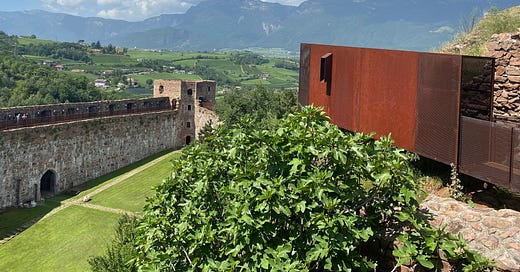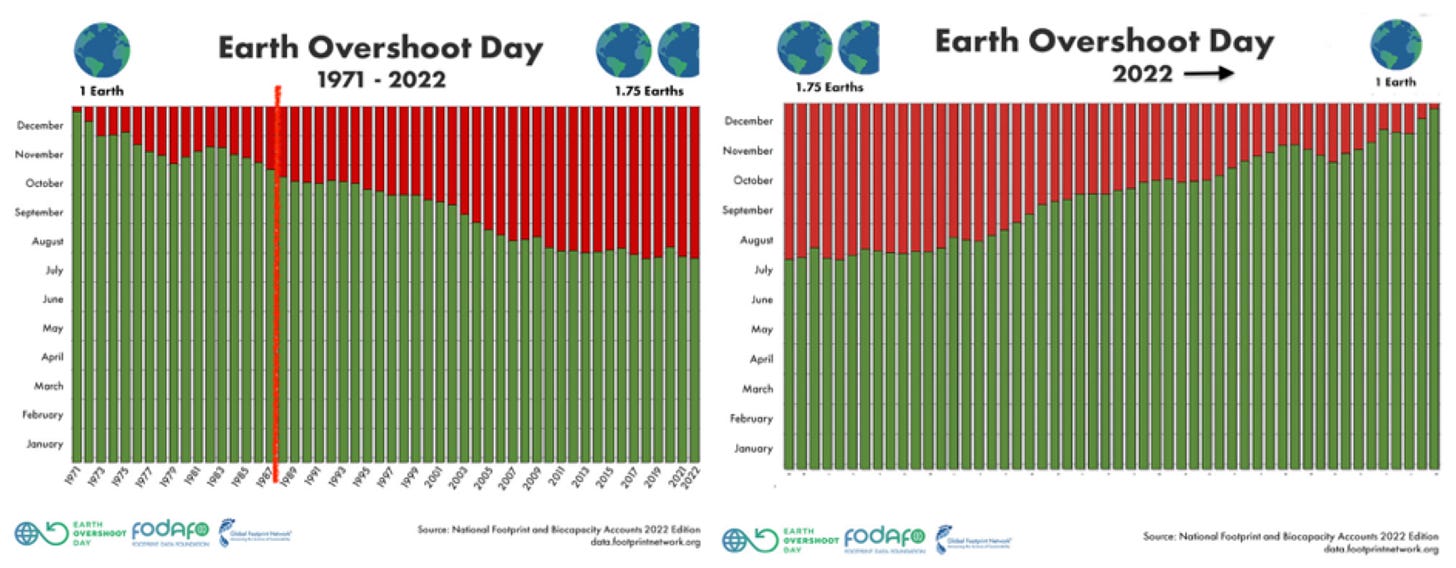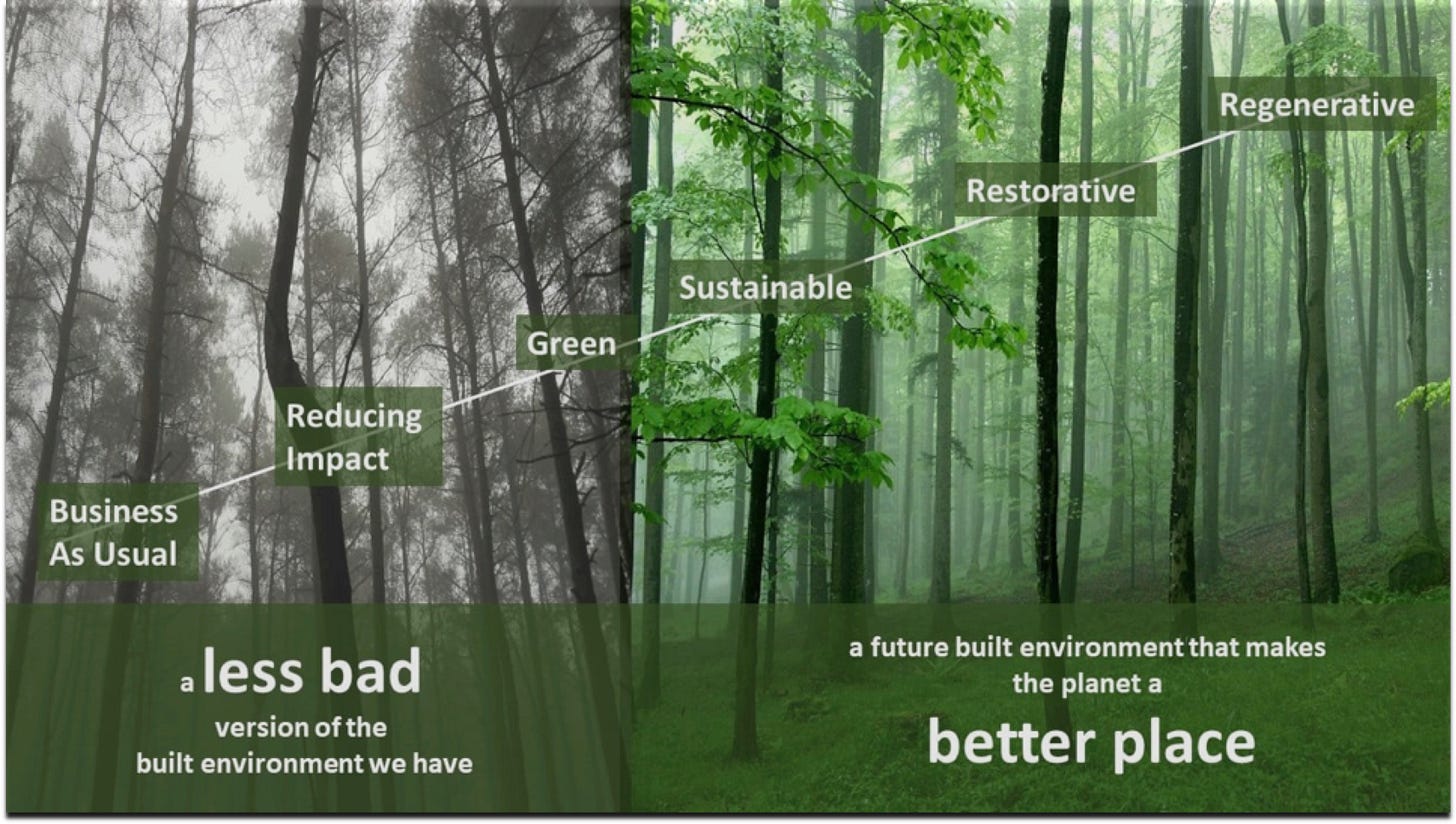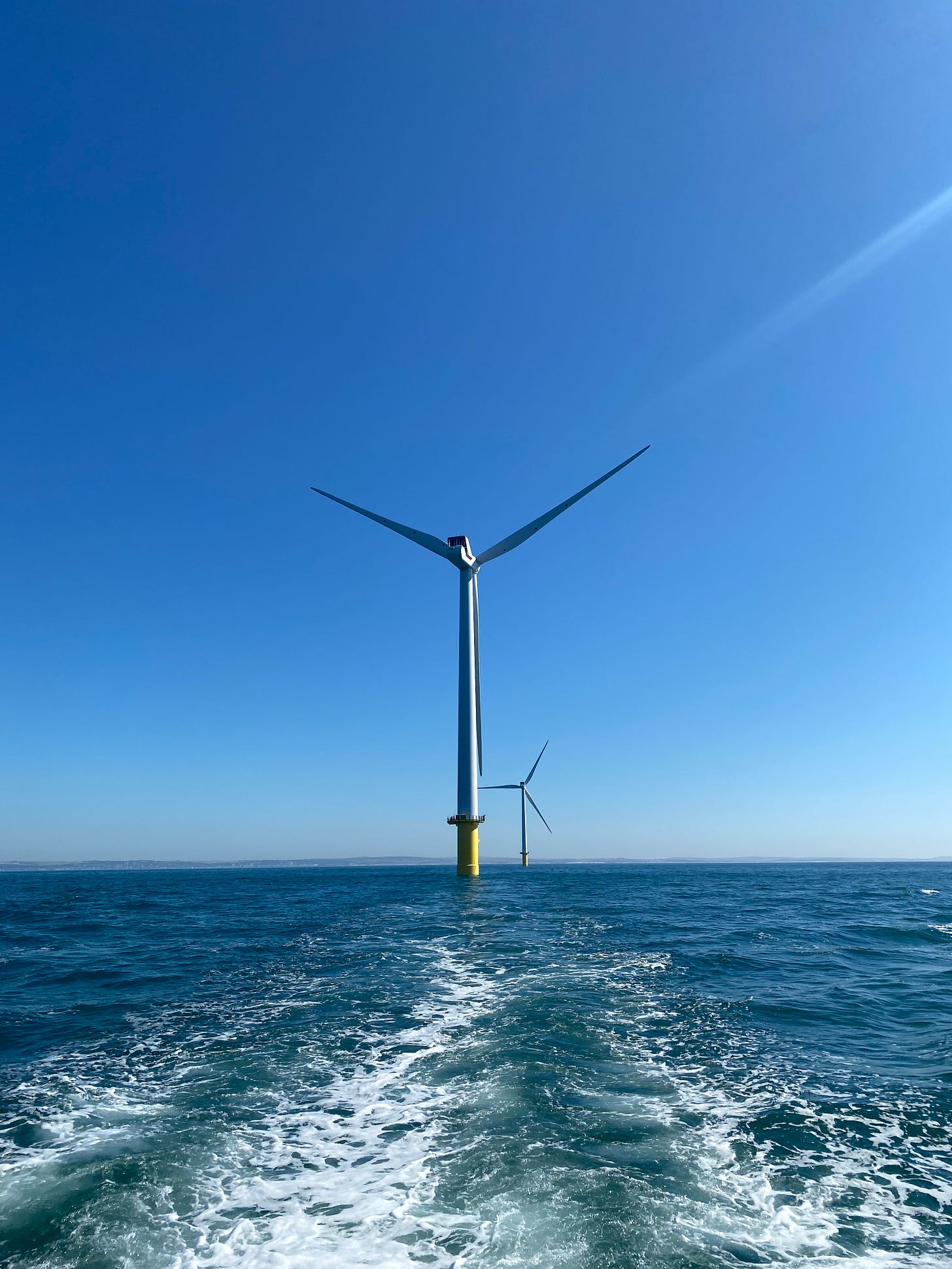Regenerative + Agile Masterclass
The future doesn’t just happen, it’s up to us all to create it.
Hi RegenNotes friends, this edition is to let you know (or remind you) more about our Living Future Europe Regenerative + Agile Masterclass taking place this autumn.
The masterclass is a unique opportunity to engage in the why, the what and the how of regenerative approaches for the built environment, against the backdrop of the climate, ecological and social forces currently shaping our world. Over a 12 week course, we combine insightful sessions with discussion and the ‘agile’ development of personal projects.
Welcome to Regen Notes - joining regenerative dots and the spaces between.
Why this masterclass?
Whilst we may no longer have the opportunity for sustainability to focus only on reducing impact, we still have a pathway to a regenerative future. Until recently we referred to such pathways as visionary, and they were, but from where we are today, they are essential for survival. Yet as pathways are time critical, our opportunities are closing, becoming more painful and increasingly more costly.
Unless we get our collaborative act together, (and go beyond just collaboration to embrace entanglement*) and act with urgency there is every chance that the changing climate and environment will undo all of our best-laid plans.
Our Living Future Europe Regenerative + Agile Masterclass is the regenerative kick-start you need this year for your practice, business or personal development.
Why – the rationale and urgency behind the need for a paradigm shift in the built environment design, construction and building management.
What– are the most advanced applicable frameworks that developers, designers, builders, and manufacturers can adopt to achieve this new type of regenerative buildings?
How – sound and robust examples and best practices immediately applicable, coming from the experience of our first 800+ ILFI registered building projects globally.
Check out further information and registration details here. … catch the early bird by the 20th August for a discount on the full fee. We kick off with the first welcome session in September.
Why do we need a regenerative lens and mindset to see and act in the world?
The three awesome charts below from Earth Overshoot, Warming Stripes and Biodiversity Loss painfully and powerfully illustrate the doom-laden negative trajectory we are on. What we see here - in the left-hand pane in terms of temperatures, resources and biodiversity - is the failure of sustainability as usual.
But - and here’s the positivity, as I have attempted to show in the right-hand panes, these charts become inspiringly positive if reversed to show the route ahead, the improvements we need to bring into the world, by seeing the potentials, looking at the world through a regenerative lens and with a positive, “we can do this” perspective.


And this means a rapid moving away from business as usual, from sustainability as usual, and embracing approaches that restore, regenerate and heal the future.
Regenerative means …
asking different and better questions, ones which can help us to recognise and work with the true interdependencies of our living world; it means nurturing the potential that all people and communities already have to be sources of health for all life on earth and giving that potential space to grow and be realised; and it means working not only to change ‘out there’ but also to change ‘in here’, our own mindsets and behaviours, and those of our organisations.
It means going on a journey, being humble, respecting one another and being ready to learn, especially from those communities who have stewarded traditional knowledge about how to live in good relationship with our world, and whose voices have often been marginalised. It means being ready to collaborate and share, because the future doesn’t just happen, it’s up to us all to create it.
Regenerative Playbook Foreward. Josie Warden RSA
Resources
For more please do visit:
Biodiversity Stripes – A Journey from Green to Grey
Living Future Europe Masterclass
RegenNotes
Increasingly, more RegenNotes content, particularly that relating to deeper learning and application, for material that will shape FutuREgenerative is moving to paid content for subscribers. Whilst giving more value back to those who already have a paid subscription. (For whom I am hugely grateful)
* Entanglement - beyond collaboration.
Quantum entanglement is the physical phenomenon that
occurs when a group of particles are generated, interact, or share spatial proximity in a way such that the quantum state of each particle of the group cannot be described independently of the state of the others, including when the particles are separated by a large distance. The topic of quantum entanglement is at the heart of the disparity between classical and quantum physics: entanglement is a primary feature of quantum mechanics lacking in classical mechanics.
Relevance for regenerative thinking?
We are increasingly aware of the connectivity of everything, from John Muir’s writings, in Barry Commoner’s four laws of ecology to Glenn Allbrect’s work on Eutierra, but how do we put that into practice - to really go beyond just simply collaborating at a business, design or individual level, for a greater good? It goes to the heart of either being apart from or being part of. And feeling that being part of, not for individual gain, but because it is the right thing to do - being in the flow of Seva and Eutierria.
… asking different and better questions, ones which can help us to recognise and work with the true interdependencies of our living world; it means nurturing the potential that all people and communities already have to be sources of health for all life on earth and giving that potential space to grow and be realised. (Regenerative Playbook)
Arne Naess, (1912-2009) Norwegen eco-philosopher, mountaineer and developer of shallow and deep-ecology concepts. (Developed whilst living remotely in a mountain hut high in the Hallingskarvet region, - perhaps echoing the remoteness of Thoreau on Walden Pond) Naess describes in eight principles, well-being and flourishing, richness and diversity, of nature, human and non-human life, having a value in themselves, and values ‘independent of the usefulness to the human world’. And as the key, principle eight empathises the “deep questioning as the process by which to follow/develop/enact all other deep ecology principles”
Grey to Bright Green
The essence of shallow to deep ecology was introduced in FutuREstorative as from Grey to Bright Green. From the grey cornucopian technology will solve our problem tomorrow, to faux green accommodationist perspective- to do as little as possible to avoid legislative penalty, to Green as a benefiting perspective, investing in the future to Bright Green of doing more good to heal the future.
At its core, regenerative is about entanglement: of nested systems, of different actors, entities, scales and timeframes, in addition to future deep time impact of actions that result from them.
It is not a surprise to see many people working in the regenerative space to also be members of the RSA (The royal society for arts, manufactures and commerce), a network of entrepreneurs, educators and innovators working to advance society, the economy and the environment, thriving on connectivity, diversity of ideas, perspectives, problems and solutions.
We envisage a world where everyone is able to participate in creating a better future. We are open, optimistic, pioneering, rigorous and enabling.
We aim to harness the curiosity, creativity and courage of our community to realise change: the knowledge and experience of our people; the expertise and global reach of our Fellowship community; and the ecosystem of influencer and organisations in society.
Regenerative approaches view entanglements for a deeper understanding of specific problems, the inter-relationships of impact and to explore potential solutions.
As our environmental management, quality and sustainability systems move online and increasingly become automated and algorithm based systems, we must ask ourselves this: do they foster and encourage a feeling of connectivity with nature, our communities and with each other? Or not? The Regenerative Playbook
Questions
A recent session within our regenerative social housing programme entailed a trip out to the English Channel to view and understand more about the Rampion off-shore wind farm from close up. In advance of the trip, to ground and prepare the group (of housing clients, social housing managers and contractors) deeper questions and possibilities were explored:
What if the sea had a place at the design or project review table, what would it tell us, what questions would we ask, how would we listen and how would we respond?
What is the connectivity between ourselves as individuals, the sea, the wind farm, marine life and back through to what we do daily? Is there circularity?
And on circularity reflection, through the lens of reciprocity, whilst we are aware of what we take from the ocean, what do we give back?
A Regenerative Playbook challenge is to question “is this degenerative or regenerative” - in this case, is the degenerative harm caused (by the manufacture/construction of the turbines and infrastructure) balanced by the regenerative marine conservation with marine species now flourishing as a result of the no fish, no trawl area of the wind farm. Are we at net-zero, negative or positive
Phytoplankton - the cool kids on the block
In preparation and to aid a different understanding of how the sea is alive, teeming with life, we used and explored The Phytoplankton, with Lewis Stagnetto, for Voices from the Ocean.







